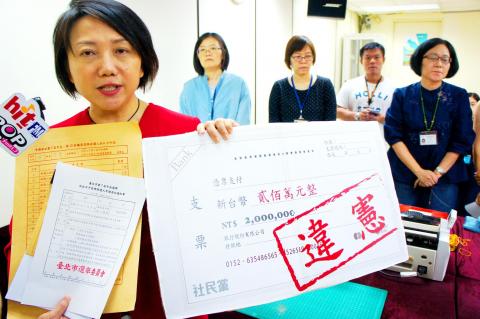Social Democratic Party (SDP) Convener Fan Yun (范雲) yesterday said she would file for a constitutional interpretation after the Taipei City Election Commission rejected her application to run for Taipei mayor on the grounds that she refused to pay an election deposit of NT$2 million (US$65,123).
“The rule about election deposits clearly contravenes Article 7 and Article 129 of the Constitution, which guarantees people’s equal right to stand for election,” she told a news conference outside the Taipei City Election Commission.
The news conference came a week after she announced on Facebook that she would withdraw from the race, citing difficulty meeting the deposit requirement.

Photo: Huang Chien-hao, Taipei Times
A deposit of NT$200,000 is required to run for mayor or county commissioner, but it is NT$2 million if the city is a special municipality.
“The rule has made the right to stand for election a privilege of the rich, preventing the young, the poor and minor parties from participating in politics,” she said.
Refusing to pay the deposit and filing for a constitutional interpretation over its legality will be a first step to reforming the nation’s money-driven political system, she said, adding that she hoped more people would join the conversation about more reasonable election requirements.
“In Taiwan, mayoral candidates are not required to have an IQ score of at least 157, a doctorate, or work experience as a city councilor or legislator. We do not ask what their platforms are — we only ask whether they have NT$2 million,” said Chen Yu-hsin (陳又新), a lawyer and SDP Taipei city councilor candidate for Neihu (內湖) and Nangang (南港) districts.
“Does having NT$2 million guarantee that a person can be a good mayor? If it is undemocratic to ban someone from standing for election based on their intelligence, diploma or experience, why is it acceptable to do so based on how wealthy they are?” Chen asked.
Minor parties and independent politicians are important to maintain the quality of democracy, as they prevent major parties from dominating the government, said Su Yen-tu (蘇彥圖), an Academia Sinica associate research fellow, urging people to back reform of the political system regardless of whether they support the SDP.
Recent examples of countries reforming their deposit requirements include Canada, he said, adding that a Canadian court in October last year ruled that a deposit requirement for prospective candidates in federal elections contravened the nation’s constitution.
Tamkang University professor Kurt Tu (涂予尹) said Taiwan should learn from the experience of other systems that offer alternatives to paying a deposit.
In California, prospective candidates for state governor have the option of submitting a minimum of 7,000 valid signatures instead of a deposit, he said.
“The only reason that the Central Election Commission set the deposit requirement at NT$2 million this year is because that has always been the rule,” he added.

ANOTHER EMERGES: The CWA yesterday said this year’s fourth storm of the typhoon season had formed in the South China Sea, but was not expected to affect Taiwan Tropical Storm Gaemi has intensified slightly as it heads toward Taiwan, where it is expected to affect the country in the coming days, the Central Weather Administration (CWA) said yesterday. As of 8am yesterday, the 120km-radius storm was 800km southeast of Oluanpi (鵝鑾鼻), Taiwan’s southernmost tip, moving at 9kph northwest, the agency said. A sea warning for Gaemi could be issued tonight at the earliest, it said, adding that the storm is projected to be closest to Taiwan on Wednesday or Thursday. Gaemi’s potential effect on Taiwan remains unclear, as that would depend on its direction, radius and intensity, forecasters said. Former Weather Forecast

As COVID-19 cases in Japan have been increasing for 10 consecutive weeks, people should get vaccinated before visiting the nation, the Centers for Disease Control (CDC) said. The centers reported 773 hospitalizations and 124 deaths related to COVID-19 in Taiwan last week. CDC Epidemic Intelligence Center Director Guo Hung-wei (郭宏偉) on Tuesday said the number of weekly COVID-19 cases reported in Japan has been increasing since mid-May and surpassed 55,000 cases from July 8 to July 14. The average number of COVID-19 patients at Japan’s healthcare facilities that week was also 1.39 times that of the week before and KP.3 is the dominant

The Chinese Communist Party’s (CCP) working group for Taiwan-related policies is likely to be upgraded to a committee-level body, a report commissioned by the Mainland Affairs Council (MAC) said. As Chinese President Xi Jinping (習近平) is increasingly likely to upgrade the CCP’s Central Leading Group for Taiwan Affairs, Taiwanese authorities should prepare by researching Xi and the CCP, the report said. At the third plenary session of the 20th Central Committee of the CCP, which ended on Thursday last week, the party set a target of 2029 for the completion of some tasks, meaning that Xi is likely preparing to

US-CHINA TRADE DISPUTE: Despite Beijing’s offer of preferential treatment, the lure of China has dimmed as Taiwanese and international investors move out Japan and the US have become the favored destinations for Taiwanese graduates as China’s attraction has waned over the years, the Ministry of Labor said. According to the ministry’s latest income and employment advisory published this month, 3,215 Taiwanese university graduates from the class of 2020 went to Japan, surpassing for the first time the 2,881 graduates who went to China. A total of 2,300 graduates from the class of 2021 went to the US, compared with the 2,262 who went to China, the document showed. The trend continued for the class of 2023, of whom 1,460 went to Japan, 1,334 went to